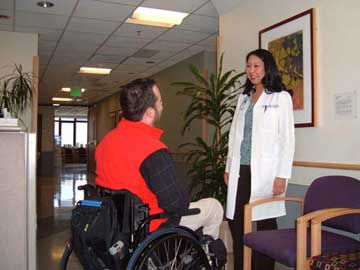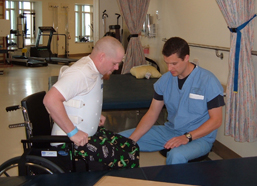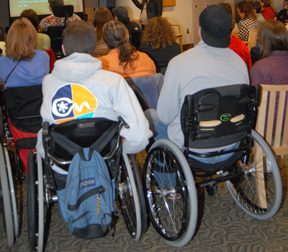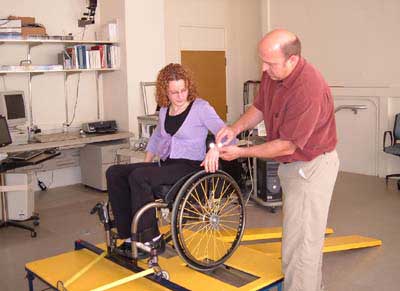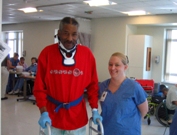SCI Forum Reports
Sports and Recreation
November 7, 2000
At 6:00 AM on the morning of July 8, 2000, seven veterans with paraplegia climbed into their handcycles at a UW parking lot and joined 8,000 cyclists for the annual Seattle-to-Portland (STP) bike ride, the Northwest's most popular biking event. A strenuous experience for anyone, the 200-mile ride presented unique challenges to these riders with spinal cord injuries. Carrie Booker, a recreation therapist at the VA Puget Sound Health Care System who coordinated and provided support for this team of vets, came to the SCI Forum to tell others with SCI "how we did it, and how you can do it."
Good planning is key. "Any event you pick," Booker advised, "make sure you are prepared and have the support you need so it's fun and successful."
The first step is to define your goals for the ride, Booker explained. "Some (team members) planned to ride all 200 miles, some only 100. One person's goal was 30 miles, but he ended up doing over 75."
It is important to have good equipment that fits well, she said. "When you're riding that amount of time, you want to make sure you're not damaging your shoulders or causing skin breakdown." The VA bought top-of-the-line handcycles for its team, but funding is also available to disabled athletes through the Challenged Athletes Foundation (888-726-3648).
Two hundred miles is a long ride, so participants need to be prepared for flat tires and other mishaps. Each paralyzed veteran was paired with a non-paralyzed cyclist carrying a cell phone, and every rider was equipped with basic repair and emergency kits so he could be semi-independent.
Booker rode in the team's support van and stayed in contact with the team via cell phone. The van carried repair equipment, food, water, catheter equipment, and egg-carton foam pads for rest stops. The Cascade Bicycle Club (CBC), which organizes the ride, provided refreshments at stops, but food was often running out by the time the VA team arrived. "Bring food!" Booker advised.
In addition to mandatory pressure releases every 20-25 minutes, riders were required to get out of their cycles at every rest stop and lie down on the egg-carton foam pads. Hydration is especially important for athletes with SCI, and all team members were supplied with plenty of water at all times. Catheter needs were calculated carefully ahead of time so adequate supplies would be available for everyone.
A good training program is necessary for an enjoyable, safe ride. The CBC has a pre-ride guide and offers workshops on training, preparation, and safety (call 206-522-3222 or visit their Web site at www.cascade.org ). The VA team started training three months before the ride, gradually increasing distance. "By the week before the ride, you need to be riding 60 miles back-to-back," Booker said.
Lodging also needs to be arranged well in advance of the ride, and CBC publishes a guide to accommodations. "A huge number of STPers camp out," said Booker. "We decided we wanted to have that experience, too." The van carried the camping equipment and drove team members the four miles to the campsites.
Ernie Butler, a handcyclist on the VA team, started training in April with his family and friends by going on rides of progressively greater distances around Puget Sound. His confidence increased along with his strength and speed.
"It's so important in a ride like the STP to set your goals," Butler said. "My goal was: one day, 100 miles. I had no desire to go to Portland."
Butler reported that his pain has decreased by 90% and his flexibility has increased by 100% as a result of his training program. He has also noticed increased sensation in his legs since starting training.
In addition to physical improvements, "the single greatest benefit was biking with my wife and daughter," he said.
Although Butler joked that "going to Portland on a bike is not a smart thing to do," he said, "I so fell in love with the bike that I sold my kayak."
Randee Young is a recreation therapist with the SKIFORALL Foundation, which provides adaptive skiing and other recreational sports opportunities year-round. SKIFORALL has ski programs at The Summit and Crystal Mountain, after-school programs, lessons for all levels of experience, and equipment for any kind of disability, Young said. Summer programs include cycling, river rafting, and hiking. SKIFORALL's Demo Days provide opportunities for people to try out their cycling equipment for free. Handcycles can be rented in the summer. Call 425-462-0978 or visit their Web site at www.skiforall.org to find out about programs and special events.
Bob Ewing co-founded the Footloose Sailing Association 10 years ago with a mission to "bring sailing to any and all disabled persons." Footloose offers sailing experiences to people with a wide range of interests and goals - some just want to go for a boat ride, others want to learn to sail, and others want to race. Children and adults are welcome.
The Footloose program takes place mostly on Lake Washington from the Leschi dock. Every year there is an overnight trip to Blake Island. Footloose currently owns four boats, each with special equipment such as rotating seats, transfer boxes, and swings to pull people from the water if they fall in "We're very careful about safety," Ewing said. Everyone wears a personal floatation device, and sailing is canceled if the wind is too strong.
Footloose operates from April or May to October. Memberships are $25, but you don't have to be a member to sail. Donations are accepted in lieu of fees for sailing events. Call 206-382-2680 for information.
The Lake Sammamish Rowing Association's Adaptive Rowing Program, operated in partnership with King County Parks and Recreation, offers rowing opportunities for persons (high school age and older) with paraplegia, polio, and other physical limitations. "It is designed for the competitive rower as well as the person who just wants to be rowed," said its president, Joanne Daniels.
Rowing takes place on the Sammamish Slough at the south end of Marymoor Park in Bellevue. "It's a beautiful location, very secluded, with no power boats causing wake," Daniels said. Sessions are from 10:00 am to noon every Saturday from the first week in June to the last week in August and cost $5 each.
Participants row in single or double flat-bottomed shells that have flotation devices for stability and adapted seats. The water is only four feet deep, so Daniels can jump in and stand up to rescue a rower who falls in. For persons who can't grip the oars, a Velcro strap is used to attach the rowers' hands to the oars.
Daniels said that rowing increases flexibility and strength, and rowers can measure their own improvements in pulling power using the ergometers (stationary rowing machines). The Adaptive Rowing Program asserts that "mastering the technique of rowing and powering the oar through the water allows a rower the sense of freedom and strength no other sport can give." Call 425-895-1704 for information.
Adam Parks, who works in REI's bike and ski shops and has paraplegia, said that the REI shop can be a good resource for people with disabilities because it will make custom-made merchandise and adapt REI products at reasonable prices.
Parks is a ski instructor for SKIFORALL and encouraged the SCI community to try the program. "If you can't move anything but your tongue, I'll get you out there so you can feel the wind," he said. "It's about exploring the world, just in a different way."

